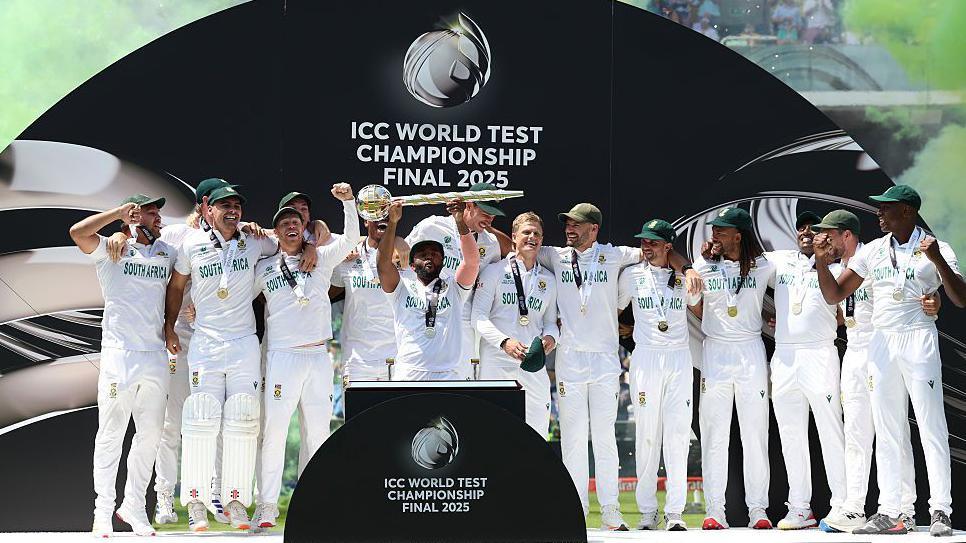Why were South Africa known as 'chokers'?
- Published
South Africa's men's cricket team have finally - after decades of near misses - got over the line to win silverware.
The Proteas beat defending champions Australia by five wickets at Lord's to win the World Test Championship.
It is their first silverware since 1998, when they claimed gold at the Commonwealth Games and won the inaugural Champions Trophy in the space of two months.
But their victory has another, arguably greater, significance, marking a massive stride in South Africa's bid to shake off one of sport's most unwanted nicknames: 'chokers'.
It's a tag which has hung heavy on the country's cricketers since 1999, so much so that even with the Proteas needing only 69 runs to win at the start of day four and with eight wickets in hand, many still fancied Australia to defend their crown.
However, while the wicket of captain Temba Bavuma three overs into the day set nerves jangling, South Africa held firm to secure their first trophy for 27 years.
"Whilst we were batting, we could hear the Aussies using that dreaded word, choke," reflected Bavuma after victory was sealed.
Get in touch
Send us your questions
1999 – the start of an unwanted legacy
Speaking to BBC Sport in 2023, former England limited-overs player Jeremy Snape - now a mental skills coach who has worked with Crystal Palace and England Rugby - defined choking in a sporting sense as "losing from a winning position, or losing a game you should win, as a result of psychological pressures and the weight of expectation".
For South Africa, the origin of their 'choker' reputation dates back to the 1999 Cricket World Cup where they snatched a tie from the jaws of victory against Australia in the semi-finals and were eliminated.
Chasing 214 at Edgbaston, South Africa headed into the final over at 205-9, needing nine runs to win.
Lance Klusener struck Damien Fleming's first two balls for four to level the scores. With four balls remaining, South Africa were one run away from the final.
After failing to score off the third delivery, Klusener went for a single off the fourth. However, Allan Donald, standing at the non-striker's end, did not hear the call and was run out by wicketkeeper Adam Gilchrist.
With the match tied, Australia advanced to the final courtesy of finishing one place above South Africa in the Super Six standings in the previous round. They went on to win the World Cup and each of the next two tournaments.
Donald, who had taken 4-32 in the first innings, told BBC Sport he "needed therapy to get over" the result but now feels it was a "special" game to be a part of.
"After the 2019 World Cup final, it's probably the greatest game of cricket of all time," he said. "It will live on forever and to be part of that is really special."

Temba Bavuma is the first South Africa captain to lift a trophy since 1998
Therapy, Beckham & a crying child - Donald's 1999 torment
- Published14 November 2023
Why South Africa keep 'choking' in World Cups
- Published7 November 2022
Caribbean calamity and weather-related mix-ups
South Africa have appeared at all 18 50-over and T20 World Cups since being reinstated to international cricket in 1991 after the country's apartheid years, but they have only reached a final once.
That was in last year's T20 World Cup in the Caribbean where they lost to India by seven runs
South Africa needed 26 runs from 24 balls in pursuit of 177 in Barbados but saw their title hopes derailed following the dismissal of Heinrich Klaasen (52 off 27) and could only score eight runs, instead of the required 16, off the final over.
In total, they've lost 10 of their 12 knockout matches across these tournaments and bowed out in the semi-finals on seven occasions.
And then there's 2003, when South Africa exited their home World Cup in the group stage after a scoreboard miscommunication.
They needed to beat Sri Lanka to progress and, as rain began to fall, word reached batter Mark Boucher that South Africa needed 229 at the end of the 45th over to win. He celebrated after hitting the penultimate ball of the over for six to reach 229, defended the final ball, and the umpires took the players off for rain as expected.
However, 229 was actually the score needed for a tie and with no resumption in play possible, South Africa were eliminated.
Their record isn't much better in the Champions Trophy. They haven't returned to the final since being crowned the inaugural winners in Bangladesh in 1998, losing all five of their semi-finals and winning just one of six knockout matches.
South Africa's knockout struggles aren't limited to men's cricket.
The Proteas have been runners-up at the past two Women's T20 World Cups, losing to New Zealand (2024) and Australia (2023), respectively, and have lost five of their seven semi-finals across 50-over and T20 World Cups.
This article is the latest from BBC Sport's Ask Me Anything team.
What is Ask Me Anything?
Ask Me Anything is a service dedicated to answering your questions.
We want to reward your time by telling you things you do not know and reminding you of things you do.
The team will find out everything you need to know and be able to call upon a network of contacts including our experts and pundits.
We will be answering your questions from the heart of the BBC Sport newsroom, and going behind the scenes at some of the world's biggest sporting events.
Our coverage will span the BBC Sport website, app, social media and YouTube accounts, plus BBC TV and radio.